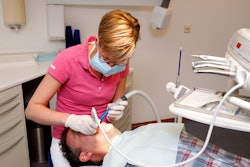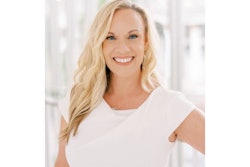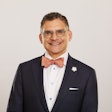In this episode, Kevin Henry and Kelly Tanner, PhD, RDH, discuss the evolving role of dental assistants, particularly in light of the introduction of oral preventive assistants and coronal scaling.
They explore the confusion and concerns among dental assistants regarding these changes, the potential impact on the relationship between dental hygienists and assistants, and the importance of advocacy within the dental profession. The conversation highlights the need for clear communication and an understanding of state regulations, as well as the challenges posed by workforce shortages in the dental field.
The ADA study mentioned during the podcast can be found here.
Kevin Henry (00:00)
Hey everyone, it is Kevin Henry, Editor-in-Chief for DrBicuspid.com. Thanks so much for joining us for another edition of "The DrBicuspid.com Podcast." Thrilled today to be joined by not only a dear friend of mine, but also our hygiene editor at DrBicuspid, and that is Dr. Kelly Tanner. Hey, Kelly, how are you doing? Always great to chat with you. Always, always love bringing you on because I know you are so in touch with what's going on with the systems out there.
Kelly (00:15)
Hey there, Kevin. Hey, nice to be with you.
Kevin Henry (00:27)
And I wanted to talk to you today about a subject that I've heard so much about from the dental assisting side of things. And I think that we're getting to a very interesting point between hygienists and assistants on the topics of the oral preventive assistant that is being introduced in some states, as well as we know that there are some states that are talking about coronal scaling that assistants can do as well.
And Kelly, I'm just going to throw out the big 30,000-foot view question here because again, I know you're in touch with so many hygienists. What's the hygiene community thinking about this change whenever it comes to assistance and what they can do in the practice?
Kelly (01:03)
The hygienists are obviously concerned. They don't really see it as a solution to the overall overarching issue of providing care, providing a standard of care, providing safety of care, because also two different states have different regulations and different boards who regulate them differently.
And so with this, it's hard to make a broad stroke opinion based on when someone says oral preventive assistant on what that actually means or to allow coronal scaling, what that actually means, because your state may have EFTAs, which are expanded function dental assistance, and Virginia, we don't have those.
And so, we don't even know, it's like everyone's not talking the same language or maybe reacting to something that may not be in their state, because they don't understand it, and they think that one thing means the same for them. So I think what's important is to understand your state, understand what's being done, to advance this position or the oral preventive assistant, or whether it's allowing assistance to do coronal scaling. And what is the standard that's being established around that? Because there's a knee-jerk reaction that I think is going on, which I understand and I agree that there needs to be some guardrails up on what defines safety for the patient and who is defining that.
So, Kevin, what's your insight on what you're hearing from the assistant perspective?
Kevin Henry (02:28)
Yeah, it's interesting because, you know, I just finished at the Star of the North meeting in the Twin Cities up in Minnesota last weekend and I talked to a few of assistants who were there. We had different states represented outside of Minnesota as well, Wisconsin, Illinois, there were a lot of, a lot of assistants from all over that were there. And I said, what are you hearing, and what are your thoughts on this? And I will tell you, there were two big points that I took out of multiple conversations I had. No. 1, the assistants that I talked to were very confused about what was going on because they said, I'm not sure that we asked for this. I'm not sure that this is something that we even want to do, but it's now being added onto what we do on the clinical side of things.
And the second one was, and you know, we're human beings, right? We want to know what's this going to be worth if we're doing it? And so, one of the assistants asked me point-blank. She said, if I'm going to start doing scaling, am I going to be paid the same amount as a hygienist? And, you know, of course I don't have an answer to that. And I don't think we have answers to that as a dental industry right now. But I don't get the feeling that assistants are pushing to have this happen. I think that they are being pulled along into it by the dental boards.
And so I think that we have to be cognizant whenever we're having this. And what I'm worried about, and I don't know about you, but I'm worried about that this is going to drive a real stake between the hygienist and the assistant community. And I feel like that neither side really wants this to happen.
But yet it's a way that they feel like they're trying to solve the shortage and trying to make sure that, you know, patients are given the best care, which is always outstanding, but I'm not sure that this is the right path for them.
Kelly (04:10)
Yeah, that's unfortunate. I mean, we have things going on in dental hygiene that ... there is a similar voice and sometimes the hygienist are like, wait a minute, what's going on? And if you're a member of your association, you tend to be more informed. But unless you say something, that means you agree also.
So what I say to folks, regardless of whether you're a dentist, dental assistant, a dental hygienist, be a part of your association so you can be a part of that voice. Because...it can be heard in larger numbers. And so you can stay informed and you will understand what's going on better to form an opinion about it versus a knee-jerk reaction. And with the oral prevention assistant, I mean, see a positive and a negative side to it. The patient may not be aware.
You know, what about the patient and what they think is going on? Will the reimbursement to the dentist be the same? Will it be coded differently? Will it, like to your point, Kevin, what will be the preparation for the dental assistant to do this? And do they want to do it? Will they be, and dental hygiene, there are some things that,
Kevin Henry (05:13)
Mm-hmm.
Kelly (05:19)
Like with general supervision, it took us forever in Virginia to get general supervision. But a lot of hygienists still don't feel like they want to be under general supervision. They don't feel comfortable with it. And so that's what I'm thinking is similar to some of the assistants. They don't want to do that. They're not comfortable with doing that. That's not what they signed up for. So then once all of, let's just say that there is a magic wand that's waved and we think that this is the solution, does it start to alienate the dental assistants and create less opportunities for them because the dental office says, only want this type of dental assistant who is willing and able to do this?
Kevin Henry (05:54)
Great point. It's a great point and it's also something that I think, you you mentioned organized dentistry a minute ago and you mentioned making sure that your voice is heard and I think that we're at a point in time in our industry where organized dentistry isn't as strong as it once was just because the numbers are dropping off a little bit and I know that this next generation maybe doesn't see the value of organized dentistry the way that their predecessors did.
And I think that that's something, speaking from the assisting side of things, I think that that's something that could ultimately hurt the assisting profession because I know the ADAA is struggling with membership and I believe that there's a lot of voice that could be heard, but unfortunately it's not a big voice right now.
And I think that, as you said, every state is different with its laws. Every state is different whether it even has representation on the state side of things from their dental assisting association. And so I think a lot of assistants right now are feeling like they're really out there by themselves. And it is that lone voice crying in the wilderness.
Kelly (06:56)
Yeah, because here on the hygiene side, it's stop this, prevent this from happening. And to your point of feeling that there could be a stake driven between both, it's like we're both fighting for something or towards something. And really the issue is that this was created, there's not enough hygienists to go around right now for various reasons.
There's a workforce shortage for various reasons that may not even be related to this. That it's waving a broad stroke to say this is going to be a cure-all, but I don't know that it is. I mean, I think that, and we can do another article on this too, Kevin, but establishing the standard for each of the profession, which I know in dental hygiene we have, dental assisting they have, dental dentistry they have. But then where does this really land to give each profession their autonomy and the construct that they're trained to do and the ability to even add on to that with additional micro certifications or certifications or different types of learning to ... put that in a direction so they can have more autonomy and ability that's chosen by them. That's not saying, you have to do this because now you work here in this state, and this is what's expected of a dental assistant.
Kevin Henry (08:09)
That's the key. It's what you choose, not what's chosen for you. And I think so often, it is. It is. And you know, and I'll be honest, a lot of dental assistants did not pursue a career in dental hygiene because they don't want to do what a dental hygienist does.
Kelly (08:12)
Yes, it's autonomy. It's autonomy.
Mm-hmm.
Kevin Henry (08:26)
They would rather do different things throughout the day and really be one-on-one with the doc. I know a lot of assistants tell me that. And so if you're asking assistance to do everything that's already on their plate, and then somehow you're trying to figure out how to add this as well, because again, there's a shortage of assistance, just like there's a shortage of hygienists, I truly fear that you're going to push more assistants into burnout.
Kelly (08:51)
Mm-hmm.
Kevin Henry (08:51)
Than ... you are to gain benefits out of this. That's my true fear of this.
Kelly (08:55)
Yeah, and alienation, and I wonder what the consequence is going to be, and if it's been thought of because we all want autonomy. Whether we're in the talking about the professional world or not, it's a human need for self-actualization for psychological safety. We don't want to feel like we're being told what to do in any part of our lives. And you know, as you're talking, Kevin, too, I'm thinking about all the things that dental assistants, how they serve the doctor, how they serve the practice, and all the different restorative procedures and their skill level and their expertise in all of these things. I mean, they are working literally hand in hand with the doctor, and they have responsibility for lab cases, for restorative procedures, keeping up with those 3D scanning, all the different materials that doctors are learning in technology. This is one more thing that comes with a lot of things.
Kevin Henry (09:47)
And let's not forget, they're often in charge of the infection control as well. And that's where I worry about the eye getting off the prize is whenever you have something that involves such a huge part of patient safety, I never want to have an assistant feel like he or she doesn't have the time to do it properly or has to cut corners because something else is being added to the plate. That's what worries me in a lot of ways.
Kelly (09:52)
Yeah.
Mm-hmm.
Yeah, what gives? Something's gotta give. You can't have so many plates spinning.
Kevin Henry (10:17)
Yeah. Well, this is our opinion. These are our thoughts on it. Certainly, there's a lot deeper dive that could be done into this. You, and I will tell you, Kelly, as I told you before, we started recording a lot of assistants I talked to in Minnesota, had no idea that this was coming, had no idea what I was talking about.
And some of you who are reading this or listening to this may not as well. So I'm to make sure to put a link from the ADA into the show notes as well as into the article if you're reading this on DrBicuspid so that you can see what we're talking about when it comes to the oral preventative assistant and kind of the various steps that are being considered on a state by state level on what can be done to help with the shortage.
And then we will be back obviously with some more information, and we're going to keep you up to date here on DrBicuspid with what's coming next. But Kelly, mean, what's, is your final thought to the hygienist just to make sure that they advocate for what's best for their profession?
Kelly (11:11)
Yeah, what's best, I think that you can never go wrong by advocating for what's best for the patient, period. And what's the patient's experience? Are they informed of who's caring for them? And what are the qualifications?
Kevin Henry (11:15)
OK.
Kelly (11:22)
... of that person who's caring for them. The dentist, the assistant, the hygienist. And I always argue that this should be a Super Bowl ad. That people need to know who is, who's caring for them, no matter what the discipline. Because people just don't know. They know what a nurse does in large. They know what a nurse practitioner does in large or a dentist in large, or they assume things. But they do not know the allied health professionals and the care that they receive. And what goes in the back end of their education, all the different skill and certifications that go into all of these professions.
Kevin Henry (11:57)
That's a great point. Hey, I know it would cost a little bit to that Super Bowl ad done, but still it would be fantastic. We have to figure out a way to not only mitigate, I don't think we're ever gonna solve the staffing shortage. I think it's going to be something that's gonna be with us moving forward, but how do we eliminate as much as we can of the frustrations that come from it? And I think that that's ...
Kelly (12:03)
Yeah.
Kevin Henry (12:23)
... a key thing, because if you're doing something to drive away more assistance and you've talked about burnout on the hygiene side, I've talked about burnout on the assisting side, and you know, let's be honest, there's burnout on the dentist side as well. And so just to add more and more to the plate, I think is how you start getting into the danger zone with the law.
Kelly (12:36)
Yeah, because then the dentist, I'm not meaning to add one thing at the very end, but that I'm thinking, who's checking behind the oral provision assistant and the one colonel, I mean, does that need another check from doctor? I don't know. And that's, these are the things we haven't figured out.
Kevin Henry (12:58)
No, and it is a ball of clay right now. And so we're going to be keeping up with it on DrBicuspid.com, not only from the hygiene side of things with Kelly and the amazing work that she's doing over there, but also, you know, with my editorial team and me keeping up with the dentist and assistant side of things to make sure that we're covering all grounds. And front office people, we're not forgetting about you either, because as Kelly said, is there a code for this? What's going on with the insurance bill?
Kelly (13:20)
That's right. They're going, what do I do?
Kevin Henry (13:25)
There's a lot to talk about. And Kelly, I appreciate your leadership. I appreciate your thoughts on this. I know it's not an easy subject, but I appreciate your willingness just to share with me kind of what's going on in the hygiene community right now.
Kelly (13:37)
Yeah, well thanks for caring about it, Kevin. I think it's important for everyone to start thinking about it and what they know and how they should form an opinion around it and the questions that they need to answer for themselves and as a professional as it moves forward.
Kevin Henry (13:50)
Sure. We appreciate Kelly. Appreciate all of you listening to this episode. And did we offer a lot of answers? Probably not, but it's good to know at least the discussion that's going on behind the scenes so that you can know if this is coming to your state, if this is coming to your practice, some of the things that you should be aware of because dentistry is changing and we want to make sure we're on top of it as much as we can be here at DrBicuspid.com. Until next time, it's Kevin Henry, editor in chief, signing off. And as always, wishing you nothing but success ahead.



















